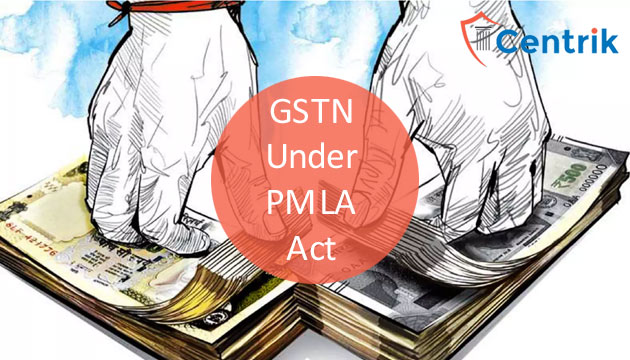
Status as on: 17/07/2023
Introduction
The Goods and Services Tax Network (GSTN) has been added to the 26th list by the amendment in the notification of the Government of India, in the Ministry of Finance, Department of Revenue, published in the Gazette of India, obliged by the PMLA to exchange information with the Enforcement Directorate and the Financial Intelligence Unit (FIU), according to a government announcement made on July 7, 2023.
This amendment was made to exercise the powers conferred by clause (ii) of sub-section (1) of section 66 of The Prevention of Money Laundering Act, 2002(15 of 2003).
The Prevention of Money Laundering Act (PMLA) has been expanded to include the Goods and Services Tax Network (GSTN). This will enable inquiry organizations like the Enforcement Directorate (ED) to ask the GST authorities for information and stop tax evasion by the creation of money tax invoices.
Several central agencies of the government, such as the Director General of Foreign Trade (DGFT), Insurance Regulatory and Development Authority of India (IRDAI), Competition Commission of India (CCI), Reserve Bank of India (RBI), Serious Fraud Investigation Office (SFO), Securities and Exchange Board of India (SEBI), and others, have already been added to the list of institutions required by the PMLA to share information with the ED and FIU.
What is GSTN?
The Goods and Services Tax Network is known as GSTN. The construction, upkeep, and management of the technical foundation for India’s Goods and Services Tax (GST) system are the purview of this nonprofit organization. Through the provision of a solid IT infrastructure for the efficient implementation and administration of GST, GSTN serves as a conduit between the government, taxpayers, and other stakeholders. It oversees the registration, submission, and processing of GST returns as well as the efficient sharing of information between the Central and State governments. The GSTN is essential in guaranteeing the smooth operation of India’s unified indirect tax framework, fostering compliance simplicity, and enhancing tax administration.
What is PMLA?
The Prevention of Money Laundering Act is known as PMLA. It is a law from India that was passed in 2002 to prevent money laundering and other similar crimes. Money laundering is the practice of hiding the true source of unlawfully obtained funds to present them as legitimate. The act was put into place to stop and regulate money laundering activities in India and to give law enforcement the resources they need to look into and punish such offenses.
The act also establishes the Enforcement Directorate (ED), a specialized organization tasked with implementing its rules.
The PMLA gives the ED broad authority, allowing it to carry out searches, seize property, and start confiscation proceedings. Additionally, it imposes duties on numerous organizations, including banks, financial institutions, and intermediaries, to put in place procedures for client due diligence, record-keeping, and reporting of suspicious activities.
Effects of bringing GSTN under PMLA
The inclusion of GSTN under PMLA will help the ED find violators who avoid taxes by creating fictitious GST invoices and employing other strategies within the GST network. With the help of the GSTN, ED will be able to more effectively track and monitor transactions and conduct case investigations.
The inclusion of GSTN in the list of entities for cross-sharing of information is a good, logical, and expected move, according to Kishore Kumar of the tax consultancy firm Taxman, now that the GST law has passed the infancy stage. Nevertheless, this makes it more important for India Inc. to provide synced records and reconciliations from the perspectives of numerous taxes and laws (now expanding to GSTN). Businesses will also need to cross-train each of their compliance teams to deal with any inquiries or investigations based on the cross-sharing of information, which will raise the cost of compliance.
Impact on Businesses registered under GST
The recent notification addressing the inclusion of GSTN under the PMLA is unlikely to have a significant impact on the compliance requirements of a businessman registered under GST. It is significant to remember that different reporting entities, such as banks, financial institutions, intermediaries, and now GSTN, are subject to the PMLA. As a result, taxpayers’ current GST compliance duties are unaffected.
CONCLUSION
In the fight against financial crimes related to GST, the recent inclusion of GSTN under the Prevention of Money Laundering Act (PMLA) is a significant development. This action makes it possible for GSTN, the Enforcement Directorate (ED), and the Financial Intelligence Unit (FIU) to share data, boosting their ability to collaborate and conduct investigations. Although these changes do not directly affect taxpayers or businesses that are GST-registered, it is nevertheless essential to maintain adherence to all rules and laws to ensure smooth operations and stay out of trouble. The integration of GSTN with the PMLA would make it easier for different authorities to work together, which is essential for preventing money laundering and maintaining the integrity of the GST system.
Disclaimer: The above article is based on the personal interpretation of the related orders and laws. The readers are expected to take expert opinions before relying upon the article. For more information, please contact us at ibc@centrik.in.




 join For Updates
join For Updates